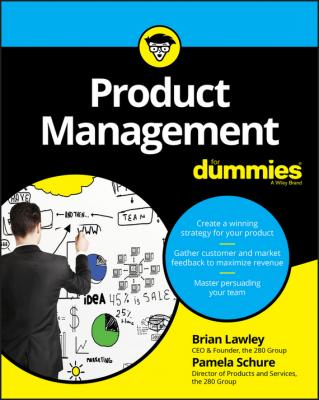Product Management For Dummies. Brian Lawley
Читать онлайн.| Название | Product Management For Dummies |
|---|---|
| Автор произведения | Brian Lawley |
| Жанр | Зарубежная образовательная литература |
| Серия | |
| Издательство | Зарубежная образовательная литература |
| Год выпуска | 0 |
| isbn | 9781119264033 |
Reaching in to your bag of tricks
As you perform all your daily tasks, you need to draw upon a range of skills. You have to get executives and other key team members to buy in and support your plans. You’ve got to learn to say no to feature and schedule requests that don’t support your strategy and plans. You need to become perceived as the de facto leader of the team – the expert on the market and the voice of the customer. And you need to execute all of that with passion, persistence, and a drive to do everything possible to make sure your product succeeds.
Product managers succeed because they have skills in the following areas:
❯❯ Communication: Product managers communicate when times are good and handle the tough situations as they come up.
❯❯ Influence: Product managers use their communications skills and more to influence and negotiate with the many stakeholders they meet in their work.
❯❯ Analysis: Product managers request, create, and absorb quantitative and qualitative data and communicate what it means effectively.
❯❯ Empathy: Product managers have great empathy for their customers and all their stakeholders. They are interested in what makes people tick and how they can help others succeed.
❯❯ Forward driving and thinking: Product managers can see into an ideal future and create almost tangible visions of what the world should look like once the rest of the world catches up to them. They want to bring others along with them in this amazing journey as they create valuable products and experiences.
Although this book offers a boatload of information, you may want to consider some outside sources to further your skills and knowledge about product management. Consider attending an in-depth course that covers the entire product life cycle and allows you to practice what you’ve learned. Check out 280group.com for a schedule of our classes, such as Optimal Product Management and Product Marketing. If available, join your local product management association; you can find a nearby one online. Join the online Association of International Product Marketing and Management (www.aipmm.com), and attend and volunteer in a local product management meetup. Work to build your product management network.
Chapter 2
Getting in Character: Discovering Your Role as a Product Manager
IN THIS CHAPTER
❯❯ Breaking down your role as a product manager
❯❯ Seeing how your job fits in with other stakeholders
❯❯ Assessing your product management skills
❯❯ Deciding who does what by using RACI and DACI
Getting started as a product manager is a question of how to wrap your arms around a very complex role, as quickly as possible. Your co-workers and boss will expect you to hit the ground running. The best approach to being a successful product manager is keeping a level head. In this chapter, we break it down so you can approach your role with outward calm and set the stage for long-term success.
Orientation Day: Examining Your Role as Product Manager
The product manager is responsible for delivering a product to market that addresses a market need and represents a viable business opportunity. A key component of the product manager’s job includes ensuring that the product supports the company’s overall strategy and goals. Although the product manager is ultimately responsible for managing the product throughout its life cycle (conception through end-of-life), he receives assistance throughout this process from specialists such as designers, developers, quality assurance engineers, supply chain and operations experts, manufacturing engineers, product marketers, program managers, sales engineers, professional services engineers, and more.
Whereas engineering is responsible for building the tangible product, product management is responsible for the whole product. The whole product is what the customer buys, and it includes everything that augments the product, from warranties, support, and training to peripherals, third-party applications, and value added partner services. The whole product encompasses the entire customer experience.
In most cases, the description of product manager covers an incredibly wide range of skills. However, most product manager roles have several key components:
❯❯ Domain expertise: Very often, this market is why your company hired you. The fact that you know the customers and the business is the main reason you’re now a product manager.
❯❯ Business expertise: People say that the product manager is the CEO of the product. Though that may or may not be true, making sure the company is generating a profit is usually involved. You need to have a suite of business skills to keep your product profitable.
❯❯ Leadership skills: Many people within your company are looking to you for guidance. If you don’t have leadership skills under your belt, you need to develop them quickly. Chapters 17 and 18 give you more details on developing leadership skills.
❯❯ Operational ability: Product managers need to dive deep into the many nitty-gritty details needed to manage a product: for example, creating part numbers or updating a spreadsheet. Sometimes you can get someone else to do these tasks, but many times you have to be responsible for them.
Checking out the job description
Why refer you to the job description? It’s where your boss has put in all her hopes and expectations of what you’ll bring to the role. And companies often define product management differently. You may see items that are usually part of project management, sales, or user experience that are included.
If this is your situation, talk to your manager about the lack of responsibility for strategy as discussed in this chapter. In some rare instances, strategy isn’t part of the product management role.
Primary responsibilities of a product manager
Here are some bullet points you may find in your job
